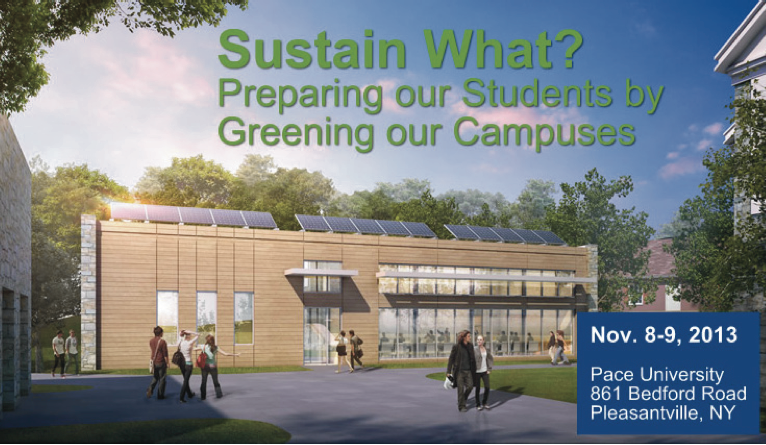The Environmental Consortium of Colleges and Universities’ Tenth Annual Conference will be held at Pace’s Pleasantville campus on Nov. 8-9.
The Pace Academy for Applied and Environmental Studies (PAAES) is the founding institution for the Environmental Consortium of Colleges and Universities (EC) and continues to maintain its headquarters on the Pleasantville campus. The EC was established in 2004 and has grown to 60 member institutions and 17 non-profit members.
“Environmental issues are interconnected in so many ways,” PAAES Program Coordinator Donna Kowal said, “and are relevant to all fields and places of business, including government, education, and the corporate world. Environmental issues run through all of our daily lives and daily decisions, from the food we eat, to the car we drive, the products we purchase, the jobs we take, and so on.”
The annual conference in November is centered on creating more environmentally friendly college campuses. “Sustain What? Preparing our Students by Greening our Campuses,” is the slogan for the conference and has encouraged the involvement of the Pace community.
“We hope a team from Pace will attend the conference to gain insights and inspiration,” Kowal said, “in order to further the greening and sustainability goals of the university”
With the groundbreaking of Pace’s master plan happening on Oct. 23, the conference can aid in developing green ideas for the changes on campus. Although the changes are not strictly associated with the conference, and the organization is not in charge of the master plan, the EC encourages the planners to consider the green options.
“Taking time to understand where our products come from, how they are made, who made them, where have they been transported from, or just learning about the plant and animal life that we share our habitat with,” Kowal said, “the more informed their decisions can be.”
Students may benefit from the many members in the EC. Through conferences and summits the students and professionals are given the opportunity to network as well as become knowledgeable of the new findings in the environmental field.
The EC will be holding their ninth Annual Student Summit this April. Every other year the summit includes a career and graduate program where there are keynote speeches by experts in the field which leads to opportunities for networking with professionals and others students. With gain in both a professional and educational opportunity, these conferences create the opportune environment for promoting these green ideas.
“The more knowledgeable people become of the impact that their decisions make,” Kowal said, “or even just taking the time to really learn about environmental issues and how things such as decisions in our daily lives affect the environment can go a long way towards positive change.”
A poster session is included in the conference each year, which allows students to showcase environmental research and projects from all regions of the EC and provides them with a chance to create connections.
Due to the fact that the EC is interdisciplinary, students that are already interested and knowledgeable in the environment attend and participate in the programs and events of the organization.
“If students are looking for a particular expert on a topic, the consortium is a great network for scholars from many different disciplines and areas of focus, spread out throughout our Hudson-Mohawk watershed,” Kowas said.
According to Kowas, on occasion the EC may be approached with opportunities that are shared with students of the belonging member university or institution. The EC may also provide the opportunity for internships or assistance with work when offered by other organizations or non-profit businesses.
Some of the other benefits that students who attend member institutions of the EC have include their annual scholarships. There are two such scholarships that, as of 2006, have been awarded annually, the Pace Law School Scholarship and the Theodore Gordon Flyfishers Founders Fund Scholarship.
“We like to encourage all students to participate and gain more insight, perhaps see things from a different perspective, different discipline, or different field of professional work,” Kowal said. “With environmental issues there are so many angles and perspectives, it is important and eye opening to have the opportunity to hear, see, and interact with people from different disciplines.”
Any Pace student has the opportunity to benefit from the research, conferences, summits, and scholarships of the EC. In Pace’s rights as a member, students are encouraged to take full advantage of these opportunities.
“By holding high value for sustainability, individual changes can make a difference to create a healthier environment and more just world,” Kowas said.


